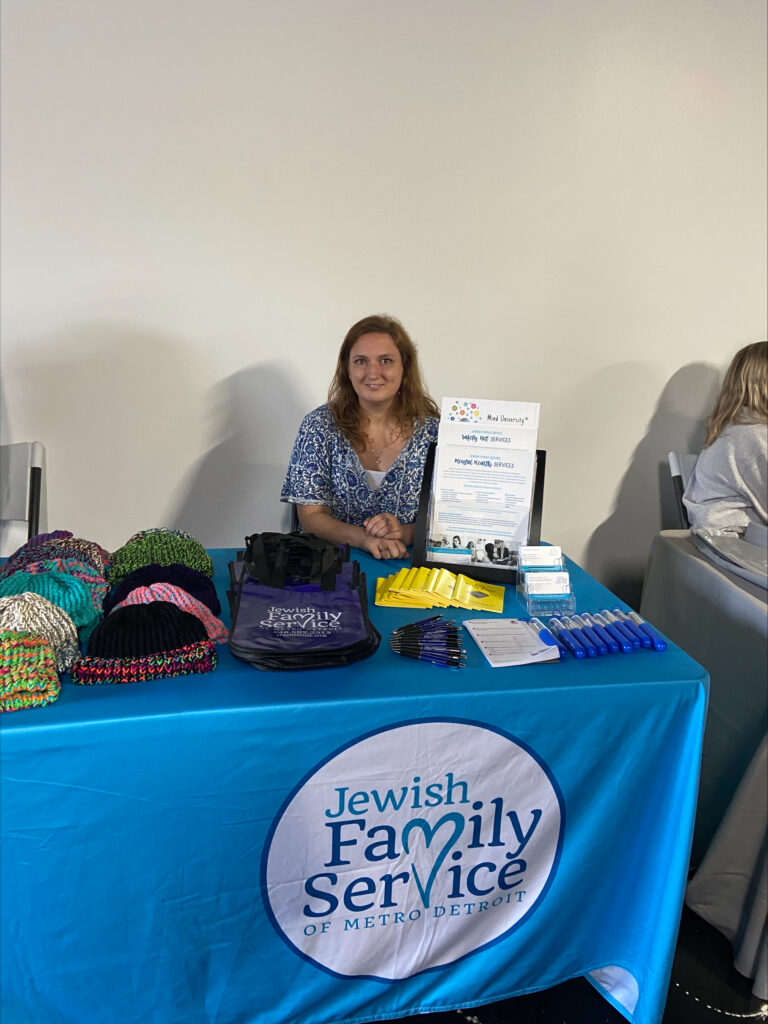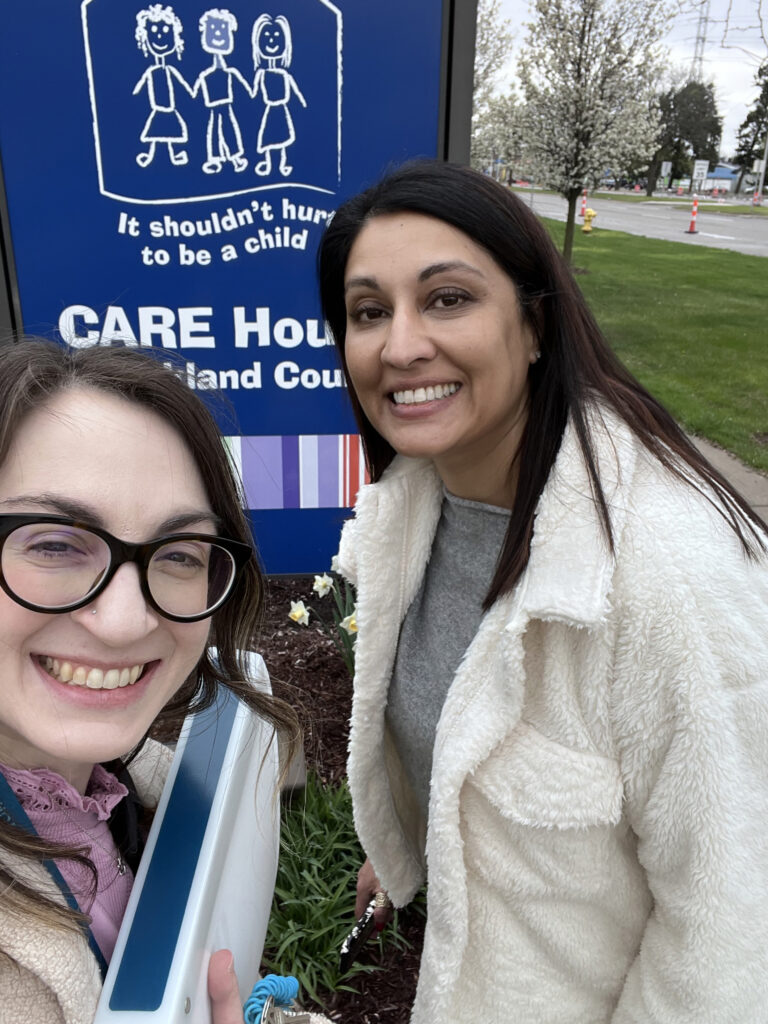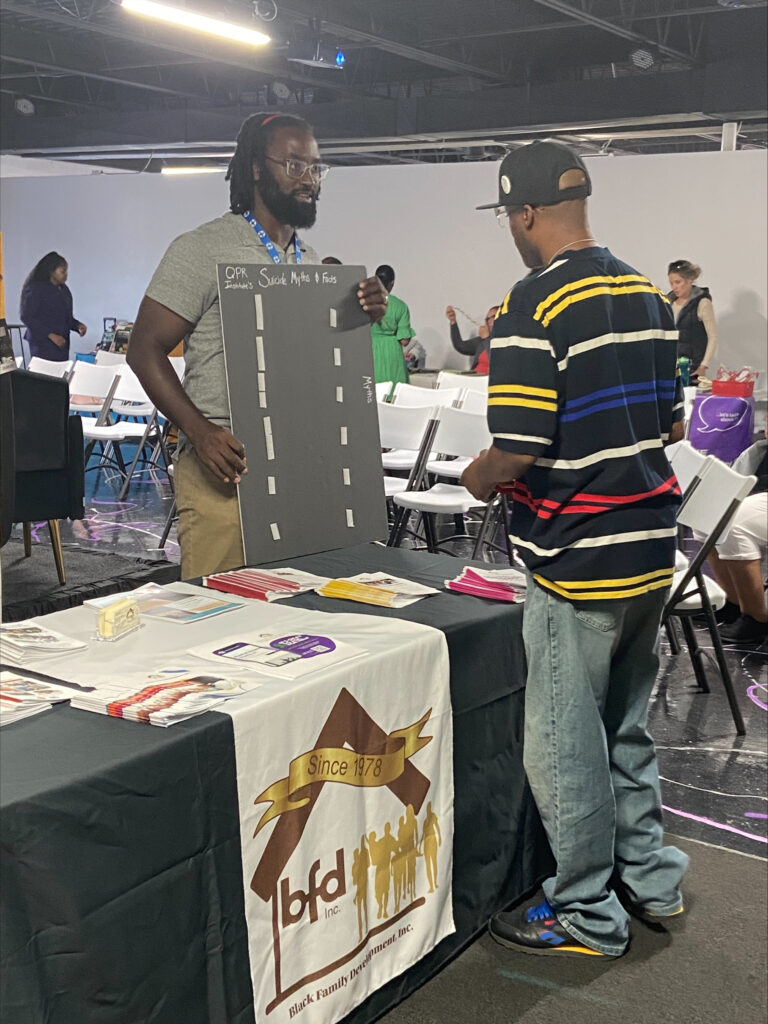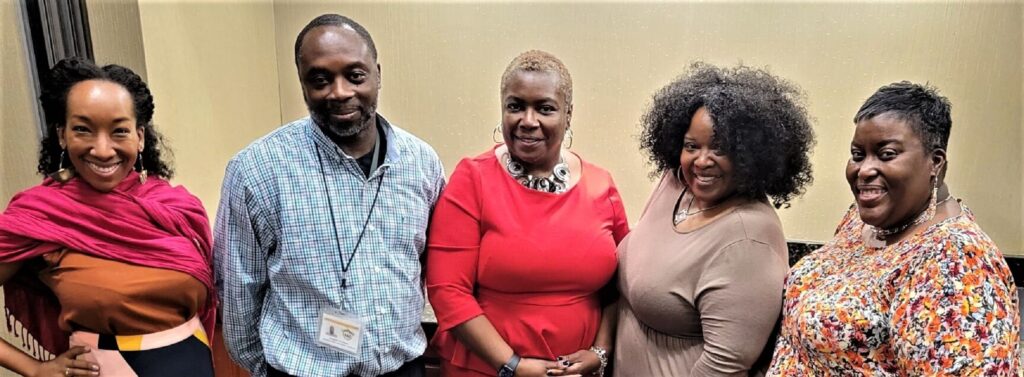United Way Partners Work to Create a Suicide Safer Community
Published on September 14, 2023 in Food and HealthPartners

Trisha Mindel’s life now bears little resemblance to her past. As the implementation manager for the suicide prevention program at Jewish Family Service of Metro Detroit (JFS), the wife and mom is a proud testament to the beauty and joy that’s possible on the other side of life’s darkest places.
Following a suicide attempt in her early 20s, Trisha felt inspired to help others and share her story.
“I decided that this experience was something other people could relate to,” Trisha said. “That’s when I actually pursued a career in social work.”
Coupling life experience and clinical knowledge, Trisha works to combat the stigma of suicide in the community and the mental health industry.
“There is such a stigma about people being broken because they have experienced certain things,” she said. “We’re not broken or defective because we’ve gone through something really hard— in fact, the opposite. We’ve been honed, we’ve been tested, and we have shown that we are able to withstand that pressure.”
THE SUICIDE EPIDEMIC



The 2022 Michigan Suicide Prevention Commission reported that every six hours a person takes their own life. According to the report, Michigan’s suicide rate has been higher than the national rate for the last four years. The American Foundation for Suicide Prevention found that for those ages 10-24, suicide is the second-leading cause of death in Michigan.
“At any given time, one in 20 people are having thoughts of suicide,” Trisha said. “Except for a brief dip during COVID times, the suicide rates have been increasing steadily—even in populations as young as 5-12 years old.”
While it’s impossible to predict what will cause a person to consider suicide, Trisha points out that it depends on an individual’s coping skills, their distress tolerance, and the fullness of their “stress bucket.”
Adverse childhood experiences such as domestic violence, losing a parent and abuse are all shown to be related to youth suicide. Other risk factors include financial hardship, food insecurity, limited access to care, and discrimination. An individual faces an increased risk for suicide when they lack basic needs.
“If you are struggling financially and can’t afford food, then you could have suicidal thoughts,” said Julia Cohen, a director of community initiatives and suicide prevention trainer at JFS. “One of the trainings we are doing is for the folks at Kosher Meals on Wheels, because if you’re homebound, you can’t go grocery shopping, you can’t get out of your house and you are struggling to have food— yes, you could be struggling with thoughts of suicide.”
The 2023 ALICE (Assets Limited, Income Constrained, Employed) report found that Michigan residents below the ALICE Threshold were more likely to feel depressed, anxious or hopeless than those living above it. By focusing on helping the ALICE population, United Way works to address some of the underlying challenges, like access to affordable food, housing and childcare that exacerbates mental health challenges.
“To fully support ALICE households requires a holistic understanding of the ways in which where we live, learn, work and play shape our health,” said Emily Mueller, director of basic needs at United Way for Southeastern Michigan. “Suicide and mental health disorders are preventable, treatable and often curable. We’re proud to work side-by-side with a robust network of partners who are dedicated to addressing the essential conditions for good health through comprehensive wraparound services that support a healthy body and mind.”
Not all populations are equally affected by the suicide epidemic. The Michigan Suicide Prevention Commission reported that Black people face increased risk factors, including experiences of racism, higher rates of unemployment, financial and food insecurity, disparities in other aspects of health, and limited access to care. Their 2022 report shows that suicide rates for Black people have increased drastically since 2017.
“We are at a pivotal time, not only on the heels of a pandemic, but we have an absorbent amount of social unrest,” said Dr. LaTonya Shelton, COO at Black Family Development, Inc (BFDI). “Kids are seeing and experiencing a significant amount of physical and emotional traumas that are connected to racism, stereotypes and biases.”
From 2018 to 2021, Black people ages 10-24 years old saw the largest increase in suicides, which grew at a rate of 37 percent, according to the study. This is particularly worrisome, according to Dr. Shelton, who said an 11-year-old child will experience anxiety more often than an adult, and it often goes untreated, unreported and unaddressed. Looking at 2001 to 2015, Black children ages 5-12 were approximately 2X more likely to die by suicide than their white counterparts.
“In youth of color, the anxiety could be related to racism, social unrest, and police brutality,” Dr. Shelton said. “We are learning that sometimes the adults in their lives don’t have the verbal means to address it and articulate it. So, kids are believing that suicide is an answer to relieve those concerns.”
In many cases, it is up to community-based organizations to connect those families with the resources they need.
PARTNERING TO EMBRACE HEALTHIER COMMUNITIES

“Everyone is not beating the door down to have therapy— even though that’s my desire,” Dr. Shelton said. “So, how can we bring the help, information, and education to their doorsteps so that they can feel empowered to thrive?”
Battling the suicide epidemic is not only a job for mental health professionals. It also requires a community effort devoted to embracing public health.
“It is my personal philosophy to embrace healthier communities,” Dr. Shelton said. “I do believe that there are individuals in the community that can be helpers and get others to be healthier; living out their own life’s purpose and their own life goals.”
As a long-time partner and funder to both organizations, United Way celebrates the collaboration of JFS and BFDI. Together, they expanded the scope of their impact and set out to achieve a suicide-safer community.
JFS began its work in suicide prevention in 2016, when Rabbi Daniel Syme created a program called A Single Soul, in response to losing a close relative, and to address the growing need for suicide prevention. The name is a reference to the Talmud, which says, “Whoever preserves a single soul, it as though she preserved a whole world.” In the last two years, the program has undergone dramatic expansions thanks to grant funding and a partnership with the BFDI.
The Oakland Together Mental Health and Wellbeing grant was administered by United Way in partnership with the Oakland County Executive and Board of Commissioners, which allocated $10 million from the American Rescue Plan Act Local Fiscal Recovery Funds to meet the growing demand for mental health support. In 2021, JFS was one of 41 organizations to receive a grant from this funding. With it, JFS was able meet the increased need during the pandemic – hiring new therapists and a behavioral health navigator while also eradicating its waitlist for outpatient counseling services.
“United Way serves as a bridge – connecting partners, funders, and government agencies for the benefit of the community,” Emily said. “Together we can make sure everyone in our community has the support they need to thrive and live a healthy life.”
Before the pandemic began, JFS and BFDI were already collaborating on ways to prevent suicide. With the help of the congressionally directed funds from the Substance Abuse and Mental Health Services Administration (SAMHSA), JFS and BFDI expanded the original A Single Soul program into a bigger program available today Suicide Prevention Trainings and Cohorts.
SUICIDE PREVENTION COHORT AND TRAININGS
Knowing that I have a great team invested in healthier communities inspires me to continue on this work each and every day.”
Both organization’s emphasis on education and community engagement led them to create free suicide prevention training programs for both laypeople and clinicians.
“Many of the therapists in our community that are doing such great work, often don’t receive suicide prevention training,” Julia said. “A lot of what you learn is kind of on the ground, boots on the floor, client in front of you—and it’s stressful and scary.”
The Suicide Prevention Cohort is available with two options: one for mental health professionals focused on adults and another for professionals focused on youth. In these cohorts, members receive comprehensive, evidence-based training in suicide prevention, intervention and treatment.
“Suicide is an illness, in and of itself,” Dr. Shelton said. “We wanted to equip clinicians to address suicide as a co-occurring disorder and equip the general public to be comfortable with connecting people to comprehensive care.”
Free suicide prevention trainings are available to all. The programs range anywhere from an hour to a couple of days, or more extended periods. The various depths in content are convenient for selecting the kind of helper one would like to become in their community.
“The idea is building a suicide-safer community through layers of competency and skill, so that we really feel our community is protected,” Trisha said. “It’s important to have widespread coverage of suicide prevention. On a certain day, if I’m not able to stop and talk to that person on the bench who looks distressed, I know that Julia is there and I’m hoping that day she’ll be able to do it.”
In July, BFDI had 42 staff members go through suicide prevention training. Overall, Dr. Shelton reports that the clinicians have felt more confident, and that they believe they have the tools and resources to do this work.
“To hear clinicians say, ‘I feel like I can do this work and I know that I am making a difference’, is inspiring,” Dr. Shelton said. “Knowing that I have a great team invested in healthier communities inspires me to continue on this work each and every day.”
The training creates an instant impact. After the first day of a two-day ASIST training session, Julia recalled a participant who said, “You won’t believe what happened! I was driving home, someone called me, and I did ASIST. I feel like I was here for a reason, that I got that information because I was actually able to help somebody on my way home from training itself.”
September is National Suicide Prevention Awareness Month and is a great time to become a helper for suicide prevention in one’s community. Sign up for one of A Single Soul’s free training courses on JFS’s website.
If you or someone you know are experiencing a crisis, call or text 988 or text TALK to 741741.